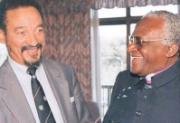
BORN on January 18, 1946 in Somerset East in rural Eastern Cape, Professor Gert Johannes Gerwel was a product of historically disadvantaged schools in the Eastern Cape.
Like most black South Africans of rural backgrounds, he had to triumph over the apartheid and Verwoerdian dictum that there was no place for blacks beyond being hewers of wood and drawers of water.
In a country deeply challenged to improve schooling so as to realise the potential and talents of all our youth, his example of a rural boy who achieved remarkable success under adverse conditions must serve as a source of inspiration for young people who struggle under the burden of dismal educational opportunities.
Gerwel was an exceptional, courageous, gifted and pioneering South African intellectual, scholar, leader, citizen and person with a profound commitment to creating a just and humane society.
Through a long and distinguished association with the higher education sector, as an academic, dean, vice-chancellor, chairperson of the Committee of University Principals in the early 1990s, chancellor, and chairperson of the Mandela Rhodes Foundation, Gerwel was an outstanding champion of higher education.
As chancellor, he challenged Rhodes to become socially conscious and think critically and imaginatively about access, equity and transformation, and about its role in socio-economic development issues in South Africa, especially in the Eastern Cape. On accepting an honorary doctorate from Rhodes, Gerwel said: "Universities are both central agents for change and steady beacons of continuity and tradition." His leadership ensured that these twin and paradoxical goals received constant close attention. He was a strong advocate of Rhodes University pursuing, in a principled manner, equity with quality and quality with equity.
He took pride in the university's academic achievements and performance in research and teaching and its increasing involvement in community engagement. The Jakes Gerwel Rhodes University Scholarship Fund is testimony to his own life of achievement and supports Eastern Cape students from socially disadvantaged backgrounds to attend Rhodes University and graduate from one of South Africa's leading universities.
Gerwel was not only a significant figure in higher education, but he was also an important beacon in the economic, social and political life of South Africa more generally. Former president Mandela has noted: "The nation drew inspiration from its defiant transformation of itself from an apartheid ethnic institution into a proud national asset: from its concrete and manifest concern for the poor, for women and rural communities, and from its readiness to grapple with the kinds of problems that a free and democratic South Africa was to deal with later".
Anglican Archbishop Emeritus Desmond Tutu recalled Gerwel saying, especially at a time when it was unpopular: "We are on the side of the downtrodden, we are going to work for the upliftment of our people". Gerwel took knowledge and intellectual work seriously. As he was to point out to the more action oriented: "good intellectual work entails hard work of a special type.
It is as difficult, if not more difficult, than organising door-to-door work, street committees and mass rallies". He did not, however, eschew action. He stood shoulder-to-shoulder with protesters in Cape Town during the defiance campaign marches of the late 1980s. And during protests at UWC that often spilled onto the streets he shielded students and academics confronted by riot police armed with rubber bullets and tear gas. Gerwel's Litertuur en Apartheid published in 1983 remains a key text in the Afrikaans and southern African literature discourse.
He also published a variety of monographs, articles, essays and papers on literary, educational and socio-political issues. Another first was when Madiba recruited Gerwel to become democratic South Africa's first director general and cabinet secretary in the Office of the President. Later he chaired the Nelson Mandela Foundation and the Mandela Rhodes Foundation, which awards postgraduate scholarships to talented students.
The numerous honorary doctorates awarded to Professor Gerwel and his extensive leadership roles in civil society, business and sport organisations are all testimony to the respect that he enjoyed in all quarters of society.
Gerwel is a magnificent symbol of intellectual, academic, social and personal integrity, professionalism and specialist expertise, courage and human good. He leaves a powerful legacy of bold leadership, critical scholarship, commitment to social justice and a humane society, and social action towards these ends.
Jakes Gerwel can rest content in the knowledge that he lived his life as advocated by an outstanding revolutionary: a person's dearest possession is their life; and since it is given to live but once, live as to feel no torturing regrets for years without purpose; so live that dying one can say: all my life and all my strength was given to the finest cause in the world — the liberation of humankind.
By Saleem Badat, Vice-Chancellor, Rhodes University
Source: Cape Times
